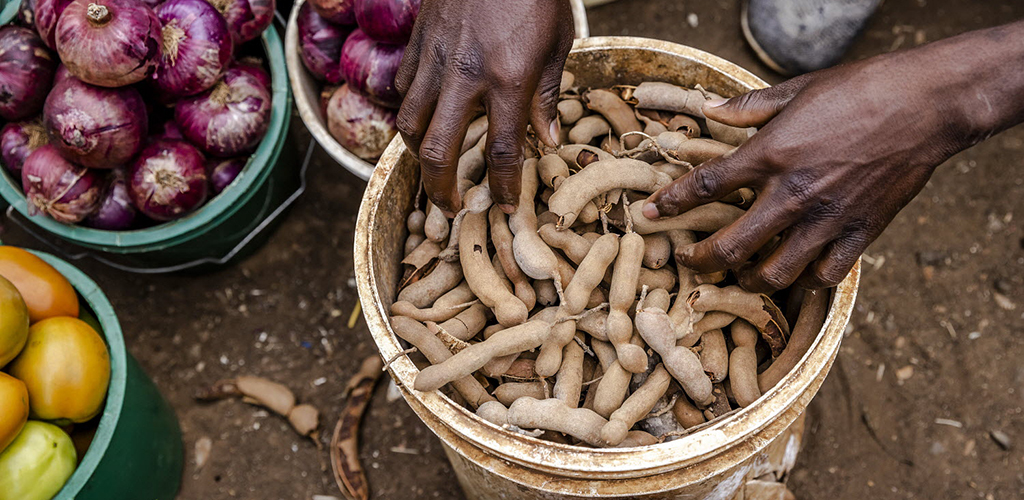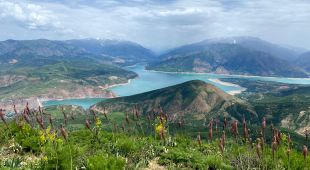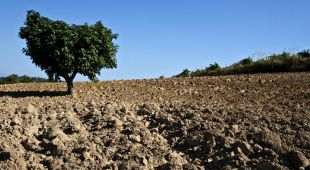This Regional Priority Programme supports Member Nations in strengthening national capacities and enhancing processes for sustainable natural resources management; adapting and mitigating climate change and reducing disaster risks in agriculture, forestry and fisheries; preserving biodiversity through natural capital investment, innovation and public–private partnerships; and reducing the environmental impacts of agrifood systems – including pollution and chemical and plastic wastes – through bioeconomy and socially inclusive and equitable approaches.
The Regional Priority Programme promotes achievement of the Paris Agreement, the Sendai Framework for Disaster Risk Reduction 2015–2030, the Convention on Biological Diversity and the Sustainable Development Goals, especially goals 1, 2, 6, 12, 13 and 15. It also contributes to the FAO Strategic Framework 2022–31 and its four betters.
The Regional Priority Programme offers a regional mechanism to assist countries in accessing climate finance, such as the Green Climate Fund (GCF) and the Global Environmental Facility (GEF), including tools and thematic support to formulate interventions at the nexus of climate change, food security, gender and rural poverty.
The Priority Programme works through three main components:
The Priority Programme leverages four FAO accelerators:
- Technology: The Regional Priority Programme promotes the most appropriate climate technologies, green technology and local knowledge to enhance evidence-based decision-making and help increase the efficiency and climate-resilience of agrifood systems.
- Innovation: The Regional Priority Programme supports countries in envisaging a new paradigm on agriculture, fisheries and forestry, helping them promote production while supporting environmental sustainability. Innovation is key to achieving this goal. This Priority Programme aims to make available science-based evidence and frameworks in collaboration with academic institutions.
- Data: To support the uptake of innovative, climate-smart technologies and policies, it is important that disaggregated data related to climate and environmental impacts be available at the national level. Data collection and dissemination are important for the deliverance of the Priority Programme’s goals across varied subjects, linking to the Hand-in-Hand Priority Programme’s geospatial platform.
- Complements: The Regional Priority Programme contributes to strengthening national and institutional capacities to develop and assess trade-offs and implement and sustain evidence-based policies and strategies for climate action, natural resources management, biodiversity and bioeconomy.
Featured news
Embedding cross-cutting themes:
- Inclusion of Indigenous Peoples, women, youth, and poor and vulnerable communities
- Regional Technical Platform on Green Agriculture
This Regional Priority Programme also contributes to the promotion of Globally Important Agricultural Heritage Systems (GIAHS), supporting the acknowledgment of traditional, highly valuable agricultural systems in the region that are examples of heritage to be preserved. The GIAHS programme recognizes these systems as outstanding landscapes of aesthetic beauty that combine agricultural biodiversity, resilient ecosystems, and valuable cultural heritage. Located in specific sites around the world, these systems sustainably provide multiple goods and services, food, and livelihood security for millions of small-scale farmers.

Events
5/3
2026
Workshop "Unlocking Carbon Market Opportunities in Serbia’s Forestry Sector: Current Landscape and Planned Developments for the Road Ahead"
Belgrade (Serbia), Hybrid Event, 05/03/2026
This hybrid workshop aims to establish and clearly define the institutional landscape of supply and demand within carbon market mechanisms (Article 6 of the Paris Agreement and the Voluntary Carbon Market), while setting realistic expectations regarding...
24/2
2026
26/2
2026
Regional training on the correct use, maintenance and repair of ultra-low volume (ULV) sprayers, Locust Management project
Bishkek (Kyrgyzstan), 24/02/2026 - 26/02/2026
A regional training course on the correct use, maintenance and repair of ultra-low volume (ULV) sprayers is planned to be conducted within the framework of the Programme for Improving National and Regional Locust Management Responses in the Caucasus and Central Asia (CCA) and the Project for Improving Locust Management (Phase 2) in Central Asia (GCP/INT/384/JCA).
5/2
2026
Launch of the E-learning course on land consolidation and land banking
Virtual Event, 05/02/2026
In recent years, the FAO has supported 13 countries in Eastern Europe with introducing land consolidation instruments and building up national land consolidation programmes. Training and capacity development have been important components of these projects and often a key determinant of project success.
22/1
2026
International Conference: Food Security in the Context of Climate Change
Ashgabat (Turkmenistan), 22/01/2026
In the context of climate change and evolving health risks, countries need to prepare their agrifood systems for the future. Frameworks already exist that offer practical pathways to address the complex interdependencies between climate change, agriculture and health. One Health is one such example. One Health is an integrated, unifying approach that aims to sustainably balance and optimize the...
5/10
2026
7/10
2026
EIFAAC 2026 International Symposium
Riga (Latvia), 05/10/2026 - 07/10/2026
The European Inland Fisheries and Aquaculture Advisory Commission (EIFAAC) 2026 International Symposium on managing and conserving inland fisheries and aquaculture resources in a changing world will be hosted by the Ministry of Agriculture of Latvia and the Institute of Food Safety, Animal Health, and Environment in Riga, Latvia on 5 to 7 October 2026. The International Symposium aims to fac...
9/12
2025
11/12
2025
Regional dialogue on accelerating progress towards sustainable, inclusive and resilient agrifood systems
Virtual Event, 09/12/2025 - 11/12/2025
Countries of Europe and Central Asia continue to advance agrifood systems transformation, recognizing their pivotal role in achieving sustainable development, food security and improved nutrition, and in addressing challenges of climate change and environmental degradation. Governments and stakeholders are pursuing integrated, multisectoral approaches that strengthen resilience, inclusiveness, ...
14/1
2026
17/1
2026
FAO at the 2026 Global Forum for Food and Agriculture
Berlin (Germany), 14/01/2026 - 17/01/2026
The Global Forum for Food and Agriculture (GFFA) is an international conference on central issues of global agricultural and food policies, held in Berlin on an annual basis. The 2026 GFFA is organized by the German Federal Ministry of Agriculture, Food and Regional Identity from 14 to 17 January in Berlin, under the overarching theme: Water. Harvests. Our Future.
4/12
2025
Celebration of World Soil Day 2025 in the Russian Federation
Moscow (Russia), Hybrid Event, 04/12/2025
FAO Liaison Office with the Russian Federation, Lomonosov Moscow State University, Moscow Timiryazev Agricultural Academy, PhosAgro, the V.V. Dokuchaev Society of Soil Science together with other partner organizations, are celebrating World Soil Day 2025 at the Soil Science Faculty of Moscow State University in a hybrid format.
3/12
2025
4/12
2025
Third regional dialogue on biodiversity mainstreaming across agricultural sectors in Europe and Central Asia
Yerevan (Armenia), Hybrid Event, 03/12/2025 - 04/12/2025
Ongoing crises are among the biggest short- and long-term risks the world is expected to face in the coming decade. Sustainable agrifood systems offer a vital pathway to address biodiversity loss while ensuring food security, nutrition and climate resilience, building on the outcomes of the 2021 First Regional Dialogue to foster a complex ecosystem approach, integrate biodiversity for food a...
20/11
2025
Workshop: EU for sustainable plant protection in Serbia
Belgrade (Serbia), 20/11/2025
The Republic of Serbia is progressing towards European Union accession, working to align its agricultural and environmental policies with the European Green Deal and the Farm to Fork and Biodiversity Strategies. Serbia’s legislative framework provides the foundation for this transition; however, additional efforts are needed to strengthen institutional and operational capacities, improve monito...
11/11
2025
13/11
2025
Training workshop: Mainstreaming biodiversity in forest management
Trabzon (Türkiye), 11/11/2025 - 13/11/2025
FAO, in close collaboration with the Turkish non-governmental organization Doğa Koruma Merkezi, is inviting representatives of government institutions responsible for agriculture or environment, academia, relevant NGOs from Azerbaijan, Kazakhstan, Kyrgyzstan, Montenegro, Tajikistan, Turkmenistan, Türkiye, and Uzbekistan to Trabzon, Türkiye to exchange experiences and learn practical approaches ...
22/10
2025
Partnership Talks: Forests through the prism of the FAO-Türkiye Forestry Partnership Programme
Istanbul (Türkiye), 22/10/2025
Join us for a special side event showcasing the achievements of the FAO-Türkiye Forestry Partnership Programme (FTFP), held during the 43rd session of the FAO European Forestry Commission (EFC) and the 8th European Forest Week.
25/11
2025
26/11
2025
Ninth Session of the Central Asian and Caucasus Regional Fisheries and Aquaculture Commission (CACFish)
Almaty (Kazakhstan), 25/11/2025 - 26/11/2025
The Central Asian and Caucasus Regional Fisheries and Aquaculture Commission (CACFish) will convene its Ninth Session in Almaty, Kazakhstan, on 25–26 November 2025, bringing together national delegates and regional experts to advance cooperation in sustainable fisheries and aquaculture. The...
13/10
2025
16/10
2025
REUFIS: Combating invasive plant species in forests and urban landscapes
Ljubljana (Slovenia), Hybrid Event, 13/10/2025 - 16/10/2025
Forest ecosystems and urban green spaces are increasingly affected by aggressive non-native plant species, leading to ecological imbalance, loss of native biodiversity, increased fire risk, and elevated management costs. The issue transcends national borders, necessitating a collaborative and regionally coordinated approach. Launched in 2017 by FAO, the Forest Invasive Species Network for Europ...
13/10
2025
17/10
2025
Workshop on Sustainable Freshwater Aquaculture: Integrating Recirculating Systems, Pond Management, and Genetic Conservation for Resilient Fish Production
Vodňany (Czechia), 13/10/2025 - 17/10/2025
The FAO Workshop on Sustainable Freshwater Aquaculture: Integrating Recirculating Systems, Pond Management, and Genetic Conservation for Resilient Fish Production will be held in Vodňany, the Czech Republic, from 13 to 17 October 2025. The event is organized in collaboration with the Faculty of Fisheries and Protection of Waters, University of South Bohemia, and the Ministry of Agricul...
23/10
2025
24/10
2025
FAO Regional Climate Workshop on Enhancing Climate Action in Agriculture in Europe and Central Asia
İstanbul (Türkiye), 23/10/2025 - 24/10/2025
Building on past Conferences of the Parties (COPs) to the United Nations Framework Convention on Climate Change (UNFCCC), including the Loss and Damage Fund, Santiago Network, and UAE Declaration on Sustainable Agriculture, and looking ahead to COP30 in Brazil, the Food and Agriculture Organization of the United Nations (FAO) is organizing a Regional Climate Workshop on Enhancin...
15/8
2025
10/11
2025
Training series on ecosystem services assessment in livestock agroecosystem
15/08/2025 - 10/11/2025
The FAO Livestock Environmental Assessment and Performance (LEAP) Partnership has announced a new series of regional trainings on ecosystem services assessment in livestock agroecosystems. The activities will take place from September to November 2025.
14/7
2025
18/7
2025
Regional Training on Geographic Information System (GIS), Forest Inventories, and Open Foris Tools
(Türkiye), Hybrid Event, 14/07/2025 - 18/07/2025
Organized by the FAO–Türkiye Forestry Partnership Programme, this regional training aims to strengthen technical skills in forest data collection and spatial analysis. The training is implemented under the project “Improving Biodiversity and Sustainable Forestry (GCP/SEC/025/TUR)” in collaboration with the CBIT-Forest II Project. The training will introduce participants to Geographic Informatio...
2/9
2025
4/9
2025
Regional Planning Meeting for GEF-9 and GCF-2
Ankara (Türkiye), 02/09/2025 - 04/09/2025
The Food and Agriculture Organization of the United Nations (FAO) has been working in collaboration with the Global Environment Facility (GEF) since 2006, and with the Green Climate Fund (GCF) since 2016, towards the transformation of agrifood systems to achieve climate-resilient food systems, while addressing the complex environmental challenges inherent in this process. Both organizations pla...
17/7
2025
National training workshop on aquaculture systems design and operation
Ashgabat (Turkmenistan), 17/07/2025
Commercial aquaculture in Turkmenistan dates backs to the early 1970s when pond fish culture was introduced to the country, however, production figures indicate that production decreased significantly after the dissolution of the Soviet Union in 1991. The reestablishment of freshwater aquaculture, especially smallholder farming models, has the potential to diversify farmer livelihoods, contribu...
See also:
Policy analysis of nationally determined contributions in Europe and Central Asia
Strategy for FAO’s work on climate change
Scaling up Agroecology Initiative
Building a common vision for sustainable food and agriculture
Strategic work of FAO for sustainable food and agriculture
Publication: Nature-based solutions
Contact
Tania Santivanez
Agricultural officer
20 Kalman Imre utca
H-1054 Budapest
Hungary
Tel: +36 1 8141 240















.tmb-th600x400.png?Culture=en&sfvrsn=1b34ce62_2)
.tmb-th600x400.png?Culture=en&sfvrsn=685f1321_2)
.tmb-th600x400.png?Culture=en&sfvrsn=4fa88d41_2)
.tmb-th600x400.png?Culture=en&sfvrsn=11a9900a_2)
cecbd9a12c114a21babceadea3dea877.tmb-th600x400.png?Culture=en&sfvrsn=8da93f7_2)
.tmb-th600x400.png?Culture=en&sfvrsn=b9dd82ee_2)
.tmb-th600x400.png?Culture=en&sfvrsn=639116db_2)
.tmb-th600x400.png?Culture=en&sfvrsn=9571a543_2)
.tmb-th600x400.png?Culture=en&sfvrsn=d076dc2c_2)




